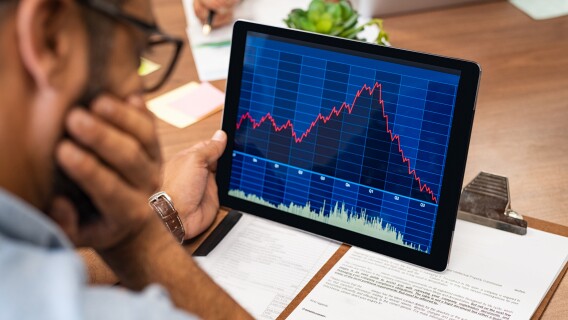With the S&P and Nasdaq trading just below all-time highs, even patient, long-term investors are probably feeling compelled to check on their stocks constantly these days.
But if you’re not planning on making any portfolio changes, are you just spinning your wheels and enduring needless worry?
So the question becomes, how often should you check on your stocks to ensure that they’re continuing to behave as hoped, that their trend is in the right direction, or that they’re continuing to pay the dividends you expect?
Finding the right level of portfolio monitoring is the difference between responsible portfolio management and unnecessary worry when a stock that you intended to buy and hold forever experiences inevitable volatility.
At the end of the day, like everything in the financial world, the answer depends largely on what kind of investing you’re doing.
If you’re a value investor, your investment horizon is often a matter of years. The undervalued stocks (with strong fundamentals and bright prospects) that you buy are expected to take some time to attain their full valuation. So if you check in on prices every couple of weeks, you’re fine. You can go on vacation and not worry about your portfolio.
[text_ad]
If you’re an income investor, your holding period may be even longer. Your primary concern is with the dividends your stocks or funds pay, and most companies declare dividends a maximum of four times per year, though many bond funds pay monthly. So if you watch your mail (or your email, or your bank statement or your broker’s report) and confirm that the dividends are still flowing, you’re probably fine.
Things start to get trickier for growth investors, the buy-low-sell-high people who are looking for relatively rapid price appreciation in their stocks. Growth investors accept increased volatility in stock prices as part of the trade-off that comes with seeking higher returns.
And increased volatility means having to pay more attention. But how much attention depends on how aggressive you are. Day traders have to pay attention all the time. Period. Most day traders zero their accounts by the end of the day. Some won’t even go for a coffee break without selling everything. This is not a lifestyle I envy.
If you’re holding a small portfolio of growth stocks with fairly high volatility, here are three guidelines on how often you should check on your stocks.
3 Times Growth Investors Must Check on Their Stocks
1. Earnings season. Earnings season brings the possibility of big price swings for all stocks, but growth stocks are especially vulnerable. So you need to know when your companies are going to release their quarterly/annual results and watch the reaction to the news very carefully.
Some companies announce the date for their earnings reports far in advance and some seem to delight in just springing them. It’s always a good strategy to look at the date for the most recent report and then pencil in a date three months later. And, of course, you need to have a plan for what you will do if the reaction is bad.
2. If you’re going off the grid for a while. Taking a solo sailboat trip around the world that will have you out of contact with civilization for a year isn’t recommended for growth investors. But you can get the same effect by just not checking.
It’s good to check in at least once a week on how your stocks are doing. And if you’re going on vacation for a couple of weeks (especially during earnings season), you should leave specific instructions with your broker (online or otherwise) about how to handle big movements. Stop losses can be a useful tool in this type of situation.
3. Just before you buy or sell anything. Your moment of maximum exposure comes immediately after you buy a stock, when there is no profit cushion to protect your position. So you should take careful note of market conditions before you put your money to work. Are markets in a supportive trend? Are there any big data releases due soon? Is a Fed meeting coming up? In general, you should be aware of these external forces, just as a sailing ship’s captain is aware of the tides and the winds before weighing the anchor and setting out to sea.
It may not come as a surprise to you that the Cabot investment advisories offer very specific, very timely advice on portfolio holdings via regular issues, updates, and special bulletins.
This can be a valuable service, but you’ll still have to pay attention.
[author_ad]
This post has been updated from a previously published version.
